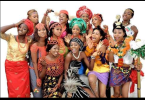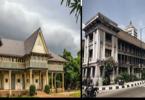Nigerian Pidgin English, a creole language based on Queen’s (British) English, is curiously becoming popular beyond the shores of the country. Nigeria’s Nollywood actors, actresses, comedians and skit-makers freely use it in movies, shows and social media – so much that it has gone viral. Additionally, many Nigerian Afrobeats, Afro-pop and rap music artists actively use Pidgin English in their popular, even globally-acclaimed songs. It is spoken so fluently and with confidence by many Nigerian youths and adults of all social classes – it is practically the street language.
It is no surprise that Nigerian Pidgin English has taken over the streets of many urban, suburban and even rural areas of Nigeria. In southern Nigeria, many traders (especially those of Igbo and Niger Delta origins) have been speaking Pidgin English for centuries. They freely use Nigerian Pidgin to communicate with their customers and neighbors (whether educated or not). Combined with gesticulations and vivid demonstrative behavior, it has become quite easy to understand.
The History of Nigerian Pidgin English
The use of Pidgin English began right from the time European explorers began to interact and trade with Africans along the West African Coast. It started with Portuguese traders and missionaries who first landed in the Niger Delta – sometime in the 17th Century.
This move to break the communication barrier resulted in diluted versions of European languages. The popular Creole, Pidgin, and Patois languages were born; and their speakers are distributed across Sierra Leone, Liberia, Ghana, Nigeria and Cameroon. Not only that, Nigerian migrants have taken the Pidgin English along with them to other countries.
Corruptions of some English, Portuguese and French words that could not be pronounced easily by the locals back then, became popular. They were mixed with commonly used local words from different tribes, and gradually became ‘standardized’ Pidgin. Additionally, they were passed down the generations. Corrupted English words such as ‘wetin’ (What thing), ‘kain’ (Kind of), ‘sabi’ (Savvy/Know), ‘comot’ (Come out of/Remove), are now very familiar.
They are interwoven with a hefty dose of ever-evolving slangs; and popular nicknames of objects, places and concepts. There are now a good deal of ‘standardized’ Nigerian Pidgin phrases.
The ease with which many Nigerians learn and speak Pidgin English is astounding – both young and old, educated or not. It is perhaps due to the viral frequency with which traders and commoners have been using it – virtually every second.
Pidgin English can be so entertaining to hear and speak as well. It is so easy to relate with others in Pidgin English, regardless of their ethnic background. It has become a common bonding factor across Nigeria.
The Popularity of Nigerian Pidgin English
Suffice it to say that the Nigerian Pidgin English is often used in a hilarious, even downright entertaining way.
The viral popularity of Nigerian Pidgin English in the streets is now recognized by top Nigerian and international media stations. The British Broadcasting Service, MaxFM, and Wazobia FM are typical examples (amongst others). They now have a crop of broadcasters who can render radio and TV shows, as well as news, fluently in Pidgin English. Many Nigerian advertising firms have equally employed models and actors/actresses who speak Nigerian Pidgin English, to render adverts.
Combine all these with songs and acts rendered in Pidgin English by top musicians, as well as comedians, movie actors and actresses in Nigeria. In all cases, they eventually became viral success stories. They were enthusiastically welcomed by fans not just across the country, but amongst the Nigerian diaspora and foreigners worldwide.
There is no doubt that far more Nigerians patronize these media stations, brands and celebrities because they speak Pidgin English. It is easier for any typical Nigerian to relate with, and understand the message in Pidgin English.
Nigerian Pidgin English and Its Cultural Significance
English remains the official language of Nigeria. But its use has become a sort of communication barrier. That barrier unofficially exists between the educated elite and non-educated; and between the rich and poor.
It also exists between people of diverse religions. It is noteworthy that Arabic and Hausa are widely spoken by people in Northern Nigeria, of which muslims are the majority. On the other hand, Christian communities in Nigeria typically use more of the English language (alongside their local dialects).
Yet again, the knowledge and use of many indigenous languages are gradually being lost to English and modern education. In the end, the largest tribal groups (Hausa, Igbo and Yoruba), and some other fairly prominent ones, have just managed to preserve their languages. Nevertheless, members of various ethnic groups in Nigeria have resisted any inducement to sacrifice their cultural identities (including their languages) for decades.
But Pidgin English has succeeded in uniting people of diverse ethnic tribes and languages together. It has helped to reduce the tension, non-comprehension, and lack of identity that resulted from the over 500 distinct indigenous languages in Nigeria. It has also opened the door to foster more cooperation and mutual tolerance across the country.
In short, Nigerian Pidgin English has acquired an authentic Nigerian identity. Even writers, politicians and other prominent people across Nigeria openly identify with Pidgin English and use it – though unofficially. It has become a viable tool for establishing unity and understanding in the midst of diversity.
Conclusion
Some language experts have indicated that over half the population of the entire Nigeria now speak Nigerian Pidgin English. This makes Nigerian Pidgin English the most widely spoken language in Nigeria. Across the world, no other creole language has as many speakers as the Nigerian Pidgin.
Very likely, the number of indigenous speakers of this language will increase over time, across Nigeria. It is suggested that it might lead to the language being recognized as one of the official languages in Nigeria.







